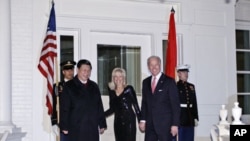China says so far, Vice President Xi Jinping's trip to the United States has been smooth and has provided an opportunity for what a Chinese official describes as a "frank and in-depth exchange of views."
Chinese Foreign Ministry spokesman Liu Weimin Wednesday gave a generally positive assessment of Vice President Xi Jinping's packed day, Tuesday, in Washington.
In brief comments, he says, overall, the Chinese vice president's visit has been smooth.
Some of the contentious issues the two sides are reported to have discussed include trade and human rights, as well as opposing viewpoints on a United Nations resolution against Syria's brutal repression of political dissent.
As Xi Jinping continues his U.S. visit, the American Chamber of Commerce in Shanghai issued its annual survey of the top concerns of American companies in China. Rising costs and an uncertain regulatory environment are two concerns. But the survey also shows that 69 percent of respondents feel that Beijing's intellectual property rights (IPR) enforcement has gotten worse or stayed the same in the past year.
AmCham calls IPR infringement in China a “significant business hindrance.”
The spokesman says China has noted these IPR concerns and has been making efforts to enhance protection.
He says protection of intellectual property rights is also good for China, so Beijing will continue to push for greater protection for that reason, not because it is yielding to outside pressure.
Meanwhile, Macau University public policy professor Wang Jianwei told VOA via Skype he thinks it does not matter if the Chinese vice president has any publicly known personal views on Sino-American relations.
“When it comes to his [Xi's] impact to U.S.-China relations, I think that, first of all, I think that he will definitely follow at least for the beginning period, he will follow the policies, more or less, of his predecessor, Hu Jintao,” he said.
Still, Wang says Chinese leaders have always given top priority to their country's relations with the United States.
“Mao was like that," he said. "Deng Xiaoping was like that. Jiang Zemin was like that. Hu Jintao was the same. So I don't think he (Xi) will make an exception, in terms of U.S.-China relations. He will still consider that U.S.-China relations are probably the most important bilateral relations. He will be personally involved in that very important relationship.”
Xi's trip to the United States includes stops in Iowa and California before returning to China Friday. He is expected to begin his ascent to China's top leadership position later this year.




